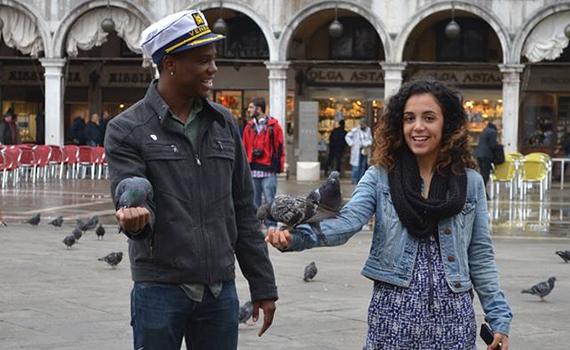Colgate students are reflecting on their summer research with faculty members on campus and in the field. This post is by Natasha Torres ’15, an educational studies major and women’s studies minor from Cleveland, Ohio, who was given an award for outstanding research at the fall student poster session.
My study abroad experience, which included a semester in Italy and extended study to South Africa, was life changing — in far more complicated ways than I had expected. My two experiences were drastically different, but both informed the reasons for conducting my research and are deeply embedded within my project.
As a student of color, while I was in Italy, I faced marginalization within a group of American students; while in South Africa, I was forced to navigate my national identity and privilege. My time abroad was complicated, hard, and spoke to larger systemic issues.
Not finding any critical literature representing experiences similar to mine, I conducted independent research this summer on the experiences of undergraduate students of color who have participated in study abroad programs with predominantly white institutions (PWIs).
I expanded on preliminary research I conducted during the spring semester of my junior year with Professor John Palmer through the Department of Educational Studies and the support of my faculty advisors Professor Mark Stern and Professor Anna Ríos.
I asked my participants questions that were born out of the questions that I ask of myself.
A crucial component of my research is to complicate the notion that study abroad is a homogenous experience. My research asks that we consider how factors such as race, class, and gender affect students’ experiences and ability to become “immersed” in the host country’s culture.
This summer I conducted in-depth interviews in hopes of learning how other students of marginalized backgrounds navigated their identities during their time abroad. Although each student negotiated his or her identity differently, notions of race, class, and gender were weaved throughout each narrative.
Themes within my findings were related to nationalism, more specifically how students navigated their nationality as Americans versus racial identities during their time abroad. Students also expressed the notions of portable culture — the manner in which the culture of the PWI transferred over to the host country during the student’s time abroad.
This opportunity has allowed me to fuse my interests in comparative education and feminist theories. The process has not only allowed me to understand my own experiences abroad, but more importantly, this research has provided an obligatory opening for critically examining how the narratives of these students can be addressed through programming, curriculum, director training, and student preparation to better serve students of color.
I plan on presenting my findings to faculty and administration this fall and continuing this work for my senior honors thesis in educational studies.
